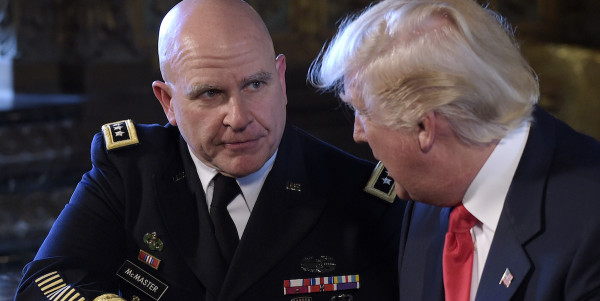

On Feb. 20, President Donald Trump announced that Army Lt. Gen. Herbert Raymond “H.R.” McMaster will replace retired Army Gen. Mike Flynn as his national security advisor. A career officer, he served during the Persian Gulf War as well as the wars in Afghanistan and Iraq.
McMaster joined the military in 1984, and is still serving on active duty. Prior to accepting this role as national security advisor, he served as the director of Army Capabilities Integration Center and deputy commanding general with U.S. Army Training and Doctrine Command. In 2005, he commanded 3rd Armored Cavalry Regiment and secured the city of Tal Afar in Iraq from Sunni insurgents. In 2006 and 2007, he was passed over twice for promotion to brigadier general, despite being one of the most revered leaders in the Iraq War.
McMaster is a also noted writer and historian. Below are five quotes that demonstrate the type of leadership and insight that McMaster brings to the White House.
Below are five quotes that demonstrate the type of leadership and insight that McMaster brings to the White House.
1. Never doubt the complexity of warfare.
In 1997, McMaster published “From Dereliction of Duty: Johnson, McNamara, the Joint Chiefs of Staff, and the Lies That Led to Vietnam,” his dissertation based on documents that were recently declassified at the time about the Vietnam War. The book strongly criticized the Joint Chiefs for their failed leadership during the war. Here’s what he wrote about conflict and how Vietnam was lost.
“It’s so damn complex. If you ever think you have the solution to this, you’re wrong and you’re dangerous.”
2. Wars are not just won or lost on the battlefield.
In “From Dereliction of Duty,” McMaster also argued that Washington politics can be just as dangerous to the military as the actual enemy.
“The war in Vietnam was not lost in the field, nor was it lost on the front pages of the New York Times or the college campuses. It was lost in Washington, D.C.”
U.S. Navy photo by Chief Mass Communication Specialist James E. Foehl

3. Great military leaders show courage in battle, but also show courage to stand up to their superiors.
In April 2013, McKinsey & Company, published a Q&A; with McMaster in which he described how militaries learn and adapt. In the interview, he specifically explained the need for military leaders who are prepared for combat on physical, psychological, and emotional levels.
“I think there are usually four causes of breakdowns in moral character—ignorance, uncertainty, fear, or combat trauma. It is important to understand the effects of those four factors on an organization and then educate soldiers about what we expect of them. We need leaders who have physical and mental courage on the battlefield, of course, but also the courage to speak their minds and offer respectful and candid feedback to their superiors. Our leaders can’t feel compelled to tell their bosses what they want to hear.”
4. We must study the past to prepare our leaders to future responsibilities and challenges.
During this same interview, McMaster also expressed the necessity of studying military history.
“As one of my favorite military historians, Sir Michael Howard, suggested, you have to study history to get its analytic power in width, in depth, and in context: in width, to see change over time; in depth, by looking at specific campaigns and battles to understand the complex causality of events that created them; and then in the context of politics, policy, and diplomacy. Studying history is invaluable in preparing our officers for their future responsibilities.”
5. We must be wary of the civilian-military divide and its threat to the “warrior ethos.”
As the director of the Army Capabilities Integration Center of U.S. Army Training and Doctrine Command, McMaster gave the keynote address at Georgetown University’s Veterans Day ceremony on Nov. 11, 2014. Here’s what he said about the warrior ethos being under constant threat:
“The warrior ethos is at risk because popular culture waters down and coarsens the warrior ethos. Warriors are most often portrayed as fragile traumatized human beings. Hollywood tells us little about the warrior’s calling or commitment to his or her fellow warriors or what compels him or her to act courageously, endure hardships, take risks, or make sacrifices.”
